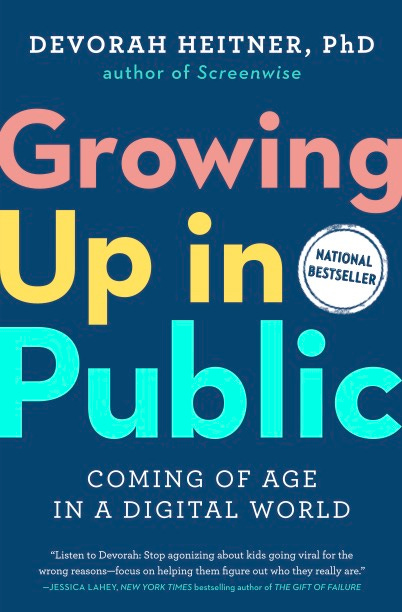What Schools Can Do When Things Go Wrong
An Interview With Devorah Heitner, Author of Growing Up In Public
Bestselling author Devorah Heitner is an expert on teens and technology who works both with schools and with parents. We first met when she reached out after hearing me talk on the radio and I vibed with her immediately, impressed by her interest in nuance and complexity, her deep understanding of teenagers and the online environment they’re navigating, and her baseline commitment to giving teenagers tools to work with rather than rules to follow—what she calls mentoring rather than monitoring. I devoured her recent book, Growing Up In Public, underlining paragraph after paragraph as she dispenses sage and down-to-earth advice about topics like online grading portals, sexting, cyberbullying, and public shaming. She’s also on Substack.
Our conversation has been edited for length and clarity.
Dashka Slater:
So of course, one of the parts of your book that I loved the most was when you talk about shame and how it appears in the online environment, both when kids screw up and then are “canceled” or shamed both online and offline, and the mirror image of that, which is when kids go after attention or validation online and then have it go wrong, which can feel shameful as well. So talk to me about how you see the dynamics around shame playing out.
Devorah Heitner:
Shame is a huge distancing measure that adults and other kids use to try to distance themselves from someone who's done something that violates their community norms. It's a way of saying, “Well, we didn't produce this. We didn't make this happen.” And of course, I'm especially thinking of when someone posts something hateful, racist, misogynist, homophobic, but really anything that doesn't reflect who we think we are, who the kids are that we're raising or educating. There's this effort to distance ourselves from that action by saying, “Well, we would never” and “We didn't teach you to do this.” And it's very self-protective. There’s a real sense of “If we can just distance ourselves enough by heaping enough shame and negative renown on this person, we can disavow it.” So in Baraboo, Wisconsin, which I wrote about, this was a way for the adults to say, “We're not hateful in Baraboo. This doesn't reflect us.” We have to go deeper and say, “Are you sure?”
Dashka Slater:
Right. So Baraboo was where some high school juniors being photographed for their junior prom raised their arms in a Nazi salute in 2018. The picture, when it went public, ignited a firestorm.
Devorah Heitner:
You have two thirds of the junior class at the high school thinking this is a really funny joke. Are you sure there's nothing that you could have done differently in the high school? And the journalists interviewing the high school students in Baraboo were like, "There’s a lot of homophobia, antisemitism and racism directed at kids here, and kids are not feeling safe."
Dashka Slater:
But as long as you can say “These are the bad kids,” then everybody else is off the hook.
Keep reading with a 7-day free trial
Subscribe to A Sigh of Relief: Talking About Justice & Accountability to keep reading this post and get 7 days of free access to the full post archives.



